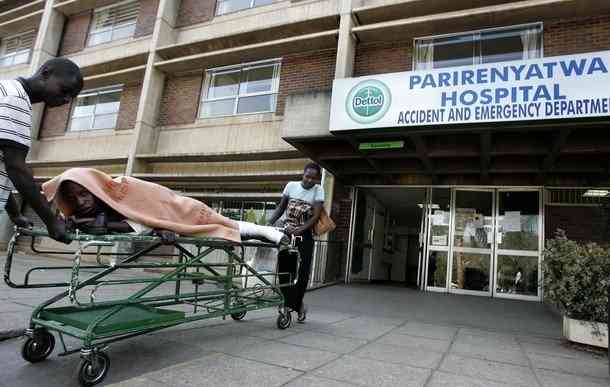
THE collapse of Zimbabwe’s health sector was laid bare this week after a Parliamentary Portfolio Committee toured the biggest public hospitals.
At Parirenyatwa Group of Hospitals, the country’s largest referral institution, the committee was told that a machine used in the early detection of cancer or breast diseases broke down 15 years ago.
“Our mammography machine has been down for more than 15 years and we have not been able to buy and replace it,” chief medical officer Tsitsi Magure told the committee.
Mammography is an X-ray imaging method used to examine the breast for early detection of cancer and other breast diseases.
Magure said the hospital had three radiotherapy machines which were “very old and due for replacement”.
We have one machine which treats cervical cancer. Unfortunately all these three radiotherapy machines are not working and we have not been able to offer radiotherapy in our unit,” she said.
At Mpilo Central Hospital in Bulawayo the second largest city, the committee was told the same old story.
The Daniel Molokele-led committee was told on Monday that cancer machines stopped functioning in 2021 and the matter has not been resolved despite having been reported.
- Mavhunga puts DeMbare into Chibuku quarterfinals
- Bulls to charge into Zimbabwe gold stocks
- Ndiraya concerned as goals dry up
- Letters: How solar power is transforming African farms
Keep Reading
A top official Solwayo Ngwenya told the committee that the hospital last performed radiation treatment three years ago.
He said government was aware of the crisis after he wrote to the parent ministry where he did not get much joy.
Lawmakers were also told that a CT scan has been out of service since October 2023 due to a software issue requiring German engineers and local attempts to resolve the problem have been unsuccessful.
These revelations could have jolted any government into action. However, it is business as usual. How can a major referral hospital in a province or in Zimbabwe operate without a CT scan? How can a broken down machine go for 15 years without being repaired or replaced?
It is evidence of neglect and lack of compassion.
This is no longer an issue of lack of resources but a question of misplaced priorities on the part of government.
It boggles the mind that government struggles to fund the health sector but splurges resources pampering lawmakers, judges, chiefs and ministers.
The health sector has suffered years of neglect which is reflected in underfunding which has seen Zimbabwe's co-operating partners chipping in to plug the gap.
The underfunding has triggered an exodus of professionals, frustrated by low salaries and lack of basic sundries, in search of greener pastures.
The Zimbabwe Medical Association says the country has an estimated 3 500 doctors for a population of almost 16 million people.
Budget allocations to the Health ministry have been below acceptable benchmarks.
In the 2024 National Budget, the ministry was allocated ZWL$6,3 trillion.
While the vote was the second largest after the Primary and Secondary Education ministry, the allocation is 10% of the total purse which is below the 15% prescribed under the Abuja Declaration, an African Union-driven process to boost the health sector.
Our health system is in the intensive care unit. The World Health Organisation identified six building blocks of a health system. These include service delivery, health workforce, health information systems, access to essential medicines, financing and leadership or governance.
Zimbabwe has been found wanting in the provision of all the six building blocks.











